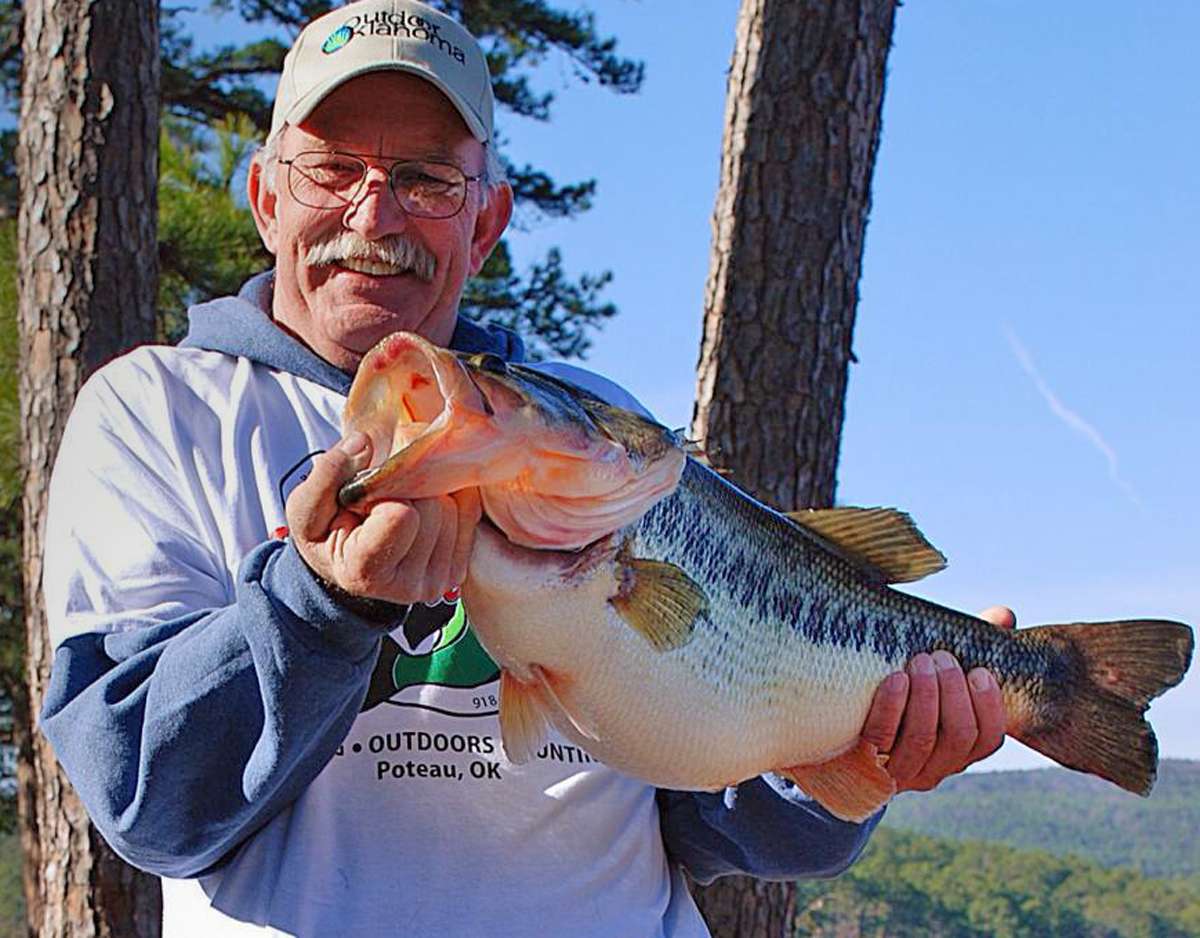
Oklahoma’s new state record largemouth bass comes from a little lake that produced two records in a year, off a modified lure that is difficult to replicate and to an angler who wasn’t really sure what he was doing.
At 14 pounds, 13.7 ounces, 26 1/8 inches long and 23 inches girth, Dale Miller’s Cedar Lake bass caught on March 13 pushes the Sooner state ever closer to the 15-pound mark.
A lifelong resident of the wooded hills of Southeast Oklahoma, Miller, 54, of Panama, and his brother, Vonnie, decided to fish 80-acre Cedar Lake in the Ouachita National Forest after they heard the lake gave up several double-digit bass. That included a state record caught a year earlier, March 23, 2012, by Benny Williams Jr. of Poteau that weighed 14 pounds, 12.3 ounces.
“They’ve been catching a lot of big ones out there and we thought we’d give it a try,” Dale Miller said. The brothers have a lifetime of experience fishing together. Vonnie, had fished Cedar a few times but Dale Miller had yet to cast a line at the lake, located just 35 miles from his home.
Miller turned to his neighbor, Josh Walls, who owns the Bass Fanatix bait shop in nearby Poteau, for advice on fishing the lake.
Walls turned Miller on to his own modified version of the Mann’s Original Alabama Rig. He adds willowleaf spinners to the rig, one at the midpoint of each of the four outer arms and a fifth, smaller one, at the end of the center arm, which he cuts down to just a couple of inches long.
For the four baits he uses a custom large-hooked 3/16-ounce weedless swimbait jighead made by a friend of his in Charleston, Ark. He tips each one with a 3.5-inch Gene Larew Sweet Swimmer.
The spinners, lightweight jigs and the Swimmers lighten the rig and give it plenty of action when fished slowly, Walls said. “It makes it a little bit lighter, but it’s still big,” Walls said.
Miller had never fished an Alabama Rig. “I wasn’t set up for all that, so he loaned me his,” Miller said. Walls gave him his personal gear, rigged and ready to cast, including a Hawg Hunter heavy action 7-foot, 11-inch rod and Abu Garcia Revo reel spooled with 65-pound-test braid.
Cedar is a relatively small, but deep and steep-banked lake that was drained and re-conditioned by the U.S. Forest Service 10 or more years ago, according to Gene Gilliland, assistant chief of fisheries for the Oklahoma Department of Wildlife Conservation. It was stocked with Florida-strain bass.
"You have a situation almost like it's a new lake," he said. "You have all the right ingredients for the production of big fish —the genetic component with the Florida strain, high productivity with almost unlimited forage and no competition, no larger predators feeding on them, and so the fish we stocked or the first few generations immediately after those have had growth conditions that are just ideal."
Walls told Miller to cast toward the steep-banked shores, let the rig sink for two to three seconds and reel it in. "I really didn't know what I was doing, I was just doing it how (Walls) explained to use it," Miller said. "We started fishing about 11 o'clock…. About the fifth or sixth cast I felt something and set the hook and, boy! Out to the middle of the lake that line went, and I said, 'Boy! I got me a good fish here.'"
Miller’s arms and knees shook as he fought the big fish to the boat. When Vonnie pulled it aboard, they were beside themselves. “I was just really excited, I almost fell in the water,” he said.
The fish was weighed and certified at the nearest Wildlife Department office at Higgins, a 90-minute drive. A fisheries technician kept the fish there overnight in a treated 200-gallon tank. They tried to release the bass in the lake but her health declined and she died two days later. The fish went to a taxidermist, and samples were taken for DNA testing and to determine its age.
